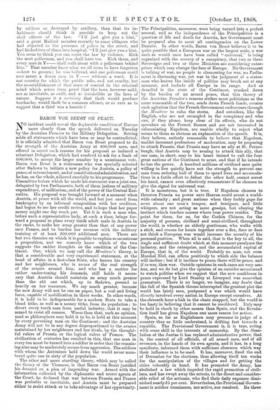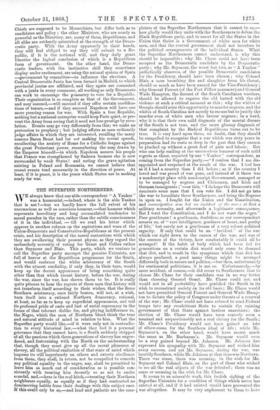BARON VON BEUST ON PEACE.
NO incident could reveal the deplorable condition of Europe more clearly than the speech delivered on Tuesday by the Austrian Premier to the Military Delegation. Setting aside all statements which have been or may be contradicted, it is officially admitted that Baron von Beust proposed to fix the strength of the Austrian Army at 800,000 men, and offered in secret such reasons for his proposal as induced a reluctant Delegation, which had resolved to ask for a limit of 600,000, to accept the larger number by a unanimous vote. Baron von Beust is a statesman who was specially selected after Sadowa to initiate a new policy for Austria, a policy of peace, of retrenchment, and of constitutionaladministration, and he has, on the whole, adhered carefully to his programme. The Committee before which he made his statement was a joint one, delegated by two Parliaments, both of them jealous of military expenditure, of militarism, and of the power of the Central Exe- cutive. His proposal was brought forward at a moment when Austria, at peace with all the world, and but just saved from bankruptcy by an informal composition with her creditors, had begun to see her credit revive, and to hope that her paper money might one day reach par. Yet it is such a man who, before such a representative body, at such a time, brings for- ward a proposal to place every tenth adult male in Austria in the ranks, to make her army greater than that of any power save France, and to burden her revenue with the military training of at least 200,000 additional men. There are but two theories on which it is possible to explain so monstrous a proposition, and we scarcely know which of the two suggests the sadder thoughts on the condition of the Con- tinent. One, which we may call the Moniteur's theory, is that a considerable and very experienced statesman, at the head of affairs in a first-class State, who knows his country and her neighbours, who is aware of the real strength of the armies around him, and who has a motive for rather under-toning his demands, still holds it neces- sary that Austria should maintain an army much greater than the old one which, up to Sadowa, pressed so heavily on her resources. We say much greater, because the new Army will not be one on paper, but a real and living force, capable of mobilization in three weeks. In other words, it is held to be indispensable for a modern State to take a blood tithe, as well as a money tithe, from its population ; to divert every tenth man from useful industry, that it may be armed to resist all comers. Worse than that, such an opinion, mad as philosophers may hold it to be, is held at this moment by every governing man on the Continent ; and the Austrian Army will not be in any degree disproportioned to the armies maintained by her neighbours and her rivals, by the thought- ful rulers of Prussia or the logical rulers of France. The civilization of centuries has resulted in this, that one man in every ten must be turned into a soldier in order that the remain- ing nine may be moderately secure from aggression. The soldiers with whom the Antonines held down the world never num- bered quite one in sixty of the population.
The other and more startling theory, which may be called the theory of the Viennese, is that Baron von Beust justified his demand on a plea of impending war. Armed with the information collected by the diplomatic and secret agents of the Court, he declared that war between Prussia and France was probable or inevitable, and Austria must be prepared either to resist attack or to take advantage of her opportunity. The Principalities, moreover, were being turned into a perfect arsenal, and as the independence of the Principalities is a question of life and death for Austria, her Government must be prepared also to meet all contingencies on the Lower Danube. In other words, Baron von Beust believes it to be quite possible that a European war on the largest scale, a war such as would once have been called "universal," is being organized with the secrecy of a conspiracy, that two or three Sovereigns and two or three Ministers are considering enter- prises which may change the face of Europe. No Government is talking of war, no people is clamouring for war, no Parlia- ment is discussing war, yet war in the judgment of a states- man who knows the inside of politics may break out at any moment, and include all Europe in its range. And so dreadful is the state of the Continent, crushed down by the burden of an armed peace, that this theory of the Austrian Premier's reasons strikes most politicians as the more reasonable of the two, sends down French funds, creates such agitation that the French Government endeavours through the Moulton. to calm the storm. And outsiders, like the English, who are not entangled in the conspiracy and who.
can, if they please, keep clear of its effects, who do not speculate on the French Bourse and are not interested in calumniating Napoleon, are unable wholly to reject what seems to them so obvious an explanation of the speech. It is, they believe, entirely reasonable to believe that Napoleon, amidst incessant professions of moderation, may be preparing to attack Prussia, that Prussia may have an ally at St. Peters-- burgh, that Austria may be arming to attack this ally, that one man, in short, may in his heart intend to call the four great nations of the Continent to arms, and that if he intends he has the power. A hundred millions of civilized men quite willing to live quietly have not the strength to prevent one man from ordering half of them to spend lives and accumula- tions in a futile effort to defeat the other half, cannot arrest his hand, cannot even effectively remonstrate if he chooses to- give the signal for universal war.
It is monstrous, but it is true. If Napoleon chooses to' threaten Prussia no power save Heaven could arrest a world- wide calamity ; and great nations when they feebly gape for news about one man's temper, and intrigues, and little whispers, are not acting as mere gossips, but obeying the- instinct which teaches masses where true power resides. The point for them, for us, for the Cochin Chinese, for the majority of persons, civilized and semi-civilized, throughout the world, is whether an elderly gentleman, who walks with a stick, and croons for hours together over a fire, does or does not think a European war would increase the security of his personal position. When all is said, that is the key to all, the- single and sufficient doubt which at this moment paralyzes the and the enterprise, and the accumulated capital of Europe, that is, of the world. Probably no man, not even Marshal Niel, can affirm positively to which side the balance- will incline ; but if it inclines to peace, there will be peace, and if to war, then war. Outside opinions in such cases are very use- less, and we do but give the opinion of an outsider accustomed to watch politics when we suggest that the new confidence in peace expressed by Lord Stanley at Liverpool was somewhat premature. There is no longer, we imagine, any doubt that the fall of the Spanish throne interrupted the greatest plot the- world has lately seen, postponed a war which would have- directly involved every nation in Europe except ourselves. At the eleventh hour a link in the chain snapped, bat the world is- too hasty in believing that it cannot be resoldered. Italy may- be held in check by other means than Spain, and the Revolu- tion itself has given Napoleon one more reason for action.
Spain, so far as Englishmen may presume to judge of a country they so little understand, is drifting fast towards a republic. The Provisional Government is, it is true, acting with some skill in the interests of monarchy. By the disso- lution of the Juntas it has replaced administrative power, that is, the control of all officials, of all armed men, and of all revenues, in the hands of its own agents, and it has, in a long manifesto, informed them with sufficient clearness which way their influence is to be used. It has, moreover, fixed the end of December for the elections, thus allowing itself ten weeks for the manipulation of the villages and for getting the cities tolerably in hand. It has promoted the Army, has abolished a law which impeded the rapid promotion of civil- ians, and has swept away the octrois, to the direct and consider- able relief of the artizans' who find their daily expenses dimi- nished nearly25 per cent. Nevertheless, the Provisional Govern- ment is neither unanimous, nor active, nor resolved. Its three Chiefs are supposed to be Monarchists, but differ both as to candidates and policy ; the other Ministers, who are nearly as powerful as the Directory, are, many of them, Republicans, and all alike are evidently astonished at the strength of the Demo- cratic party. With the Army apparently in their hands, they still feel obliged to say they will submit to a Re- public, if it is the national will, and they daily grant liberties the logical conclusion of which is a Republican form of government. On the other hand, the Demo- cratic leaders, with the instinctive skill they sometimes display under excitement, are using the natural system of Spain —government by committee—to influence the elections. A Central Democratic Junta has been formed in Madrid, to which provincial juntas are affiliated, and they again are connected with a junta in every commune, all working as only Democrats can work to encourage the peasantry to vote for a Republic. Their organization is as complete as that of the Government, and may succeed,—will succeed if they offer certain modifica- tions of tenure,—and if they succeed Napoleon will have one more pressing reason for war. With Spain a free Republic, nothing but a national enterprise would keep Paris quiet, or pre- vent the Army from seeing that it need not lose prestige by revo- lution. Events may go very differently from this; we make no pretension to prophecy ; but judging affairs as men ordinarily judge affairs in which they are interested, recalling the many reasons Baron Beust had for not making his recent speech, recollecting the anxiety of Rome for a Catholic league against the great Protestant power, remembering the map drawn by the Emperor himself—in which Napoleon assures his people that France was strengthened by Sadowa because she is now surrounded by weak States I and noting the grave agitation existing in Poland and Roumania, we cannot believe that recent events tend necessarily in the direction of peace. At least, if it is peace, it is the peace which States use in making ready for war.































 Previous page
Previous page